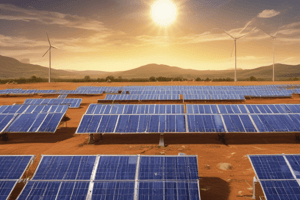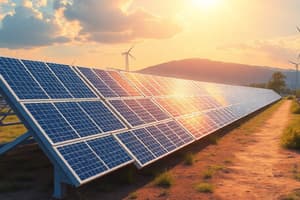Podcast
Questions and Answers
What is the main reason monocrystalline solar panels are the most expensive?
What is the main reason monocrystalline solar panels are the most expensive?
- They are made from a single crystal of silicon. (correct)
- They have a higher production efficiency.
- They are manufactured using rare materials.
- They require less time to manufacture.
Which type of solar panel has the lowest efficiency?
Which type of solar panel has the lowest efficiency?
- Monocrystalline
- Film PV (correct)
- Hybrid PV
- Polycrystalline
Which arrangement of solar panels is referred to as a string?
Which arrangement of solar panels is referred to as a string?
- Panels arranged in series. (correct)
- Panels fixed at various angles.
- Panels arranged in parallel.
- Multiple strings connected in series.
How is solar power output affected by the Earth's tilt and orbit?
How is solar power output affected by the Earth's tilt and orbit?
What role does the inverter play in a solar PV system?
What role does the inverter play in a solar PV system?
What determines the efficiency of a solar panel?
What determines the efficiency of a solar panel?
Why is photovoltaic energy considered predictable despite its intermittent nature?
Why is photovoltaic energy considered predictable despite its intermittent nature?
What is the correlation between the speed of crystal formation and solar panel cost?
What is the correlation between the speed of crystal formation and solar panel cost?
What is the primary role of semiconductors in solar cells?
What is the primary role of semiconductors in solar cells?
Which statement correctly describes the band gap energy levels in semiconductors?
Which statement correctly describes the band gap energy levels in semiconductors?
How does electron flow in circuits relate to the properties of conductors and semiconductors?
How does electron flow in circuits relate to the properties of conductors and semiconductors?
What factor plays a key role in the efficiency of solar cells?
What factor plays a key role in the efficiency of solar cells?
What is the process of photovoltaic energy conversion?
What is the process of photovoltaic energy conversion?
Which characteristic distinguishes semiconductors from insulators?
Which characteristic distinguishes semiconductors from insulators?
Which form of solar energy involves the use of mirrors to concentrate solar radiation for power generation?
Which form of solar energy involves the use of mirrors to concentrate solar radiation for power generation?
What percentage of the energy received at the Earth's surface originates from the Sun?
What percentage of the energy received at the Earth's surface originates from the Sun?
What happens to the voltage between the terminals of a solar cell when it is exposed to sunlight?
What happens to the voltage between the terminals of a solar cell when it is exposed to sunlight?
Which side of the solar cell primarily collects excess electrons?
Which side of the solar cell primarily collects excess electrons?
What role do the ions in the depletion zone play in a P-N junction?
What role do the ions in the depletion zone play in a P-N junction?
During solar energy absorption, where do most of the generated electron holes concentrate?
During solar energy absorption, where do most of the generated electron holes concentrate?
What component helps to reduce energy loss from reflection in solar cells?
What component helps to reduce energy loss from reflection in solar cells?
What occurs in a solar cell circuit when the N-side and P-side terminals are connected?
What occurs in a solar cell circuit when the N-side and P-side terminals are connected?
Which part of the solar cell is mainly responsible for receiving and processing solar energy?
Which part of the solar cell is mainly responsible for receiving and processing solar energy?
What is the effect of sunlight on the conductive band within a solar cell?
What is the effect of sunlight on the conductive band within a solar cell?
Flashcards
Monocrystalline PV
Monocrystalline PV
Solar panels made from single silicon crystals, offering high efficiency.
Polycrystalline PV
Polycrystalline PV
Solar panels made from multiple silicon crystals, offering a balance of cost and efficiency.
Film PV
Film PV
Thin, flexible solar panels made of amorphous silicon, offering low cost and flexibility but lower efficiency.
Solar Panel String
Solar Panel String
Signup and view all the flashcards
Solar Panel System
Solar Panel System
Signup and view all the flashcards
Solar Insolation
Solar Insolation
Signup and view all the flashcards
Solar Resource Predictability
Solar Resource Predictability
Signup and view all the flashcards
Solar PV System Arrangement
Solar PV System Arrangement
Signup and view all the flashcards
What happens when electrons leave their bonds?
What happens when electrons leave their bonds?
Signup and view all the flashcards
How do ions in the depletion zone affect electrons and holes?
How do ions in the depletion zone affect electrons and holes?
Signup and view all the flashcards
What happens to electrons and holes under sunlight?
What happens to electrons and holes under sunlight?
Signup and view all the flashcards
How does sunlight affect voltage?
How does sunlight affect voltage?
Signup and view all the flashcards
What happens when a conductor connects the N and P sides?
What happens when a conductor connects the N and P sides?
Signup and view all the flashcards
What's the role of the N-side in a solar cell?
What's the role of the N-side in a solar cell?
Signup and view all the flashcards
What's the role of the P-side in a solar cell?
What's the role of the P-side in a solar cell?
Signup and view all the flashcards
Primary Energy Sources
Primary Energy Sources
Signup and view all the flashcards
How is a solar panel constructed?
How is a solar panel constructed?
Signup and view all the flashcards
Solar Energy Applications
Solar Energy Applications
Signup and view all the flashcards
Passive Solar Heating
Passive Solar Heating
Signup and view all the flashcards
Concentrated Solar Power (CSP)
Concentrated Solar Power (CSP)
Signup and view all the flashcards
Solar Photovoltaic (PV)
Solar Photovoltaic (PV)
Signup and view all the flashcards
Semiconductors
Semiconductors
Signup and view all the flashcards
Valence Shell
Valence Shell
Signup and view all the flashcards
Study Notes
Overview of Solar Energy
- Solar insolation is a primary energy source, used for space heating, water heating, and thermoelectric power generation.
- Solar cells convert solar energy directly into electricity.
- The chemistry of semiconductors is key to solar cell function.
- Solar PV (photovoltaic) systems, involving solar panels and solar arrays, and the economics of solar systems are discussed.
Lecture Outline
- 99.9% of Earth's surface energy comes from the sun.
- Most primary energy sources rely on the sun directly or indirectly.
- Solar radiation can be used directly for work.
- Four major solar energy forms: passive solar, solar heating, concentrated solar, and solar photovoltaics (PV).
- Solar PV systems consist of solar panels, which contain solar cells, made of semiconductors.
- Semiconductors have varying conductivity, ranging from conductors to insulators, dependent on how tightly electrons are bound. The difference is based on how tightly the outer electrons are bound in the outermost electron shell around the atomic nuclei.
- Electrons in a conductor can easily move about.
- Electrons in a valence band of an atom will break out into a conductive band with a certain amount of energy (band gap).
- Insulators have a wide band gap, making it difficult for electrons to jump.
- Conductors have a small or nonexistent band gap.
- Semi-conductors have a moderate or small band gap.
Semiconductors (Detailed)
- Semiconductors exist on a spectrum from conductors to insulators.
- Conductors conduct electricity, while insulators do not.
- The difference in conductivity lies in how tightly electrons are held in the outermost electron shell of the atom (valence shell).
Semiconductor Doping
- Semi-conductors are created by doping silicon with other elements to alter its electron properties.
- N-type semiconductors have extra electrons.
- P-type semiconductors have fewer electrons.
P-N Junction
- A P-N junction forms when N-type and P-type semiconductors are joined.
- Excess electrons in the N-type material are attracted to excess electron holes in the P-type material.
Solar Cell Operation
- Electrons move from the N-side to the P-side when sunlight is present.
- The depletion zone creates an electric field opposing electron movement.
- The width of the band gap is the same for both sides of the semiconductor, but the absolute energy level at the bottom of the band gap is greater on the P-side than the N-side.
- Electrons tend to concentrate on the N-side, and holes concentrate on the P-side.
Solar Cell Construction
- Solar panel construction uses multiple solar cells in series.
- The total panel voltage is the sum of the cell voltages.
Types of PV Cells
- Monocrystalline PV cells: Made from single silicon crystals, most expensive, highest efficiency (17-22%).
- Polycrystalline PV cells: Made from multiple interlocking silicon crystals, faster to create, lower cost, lower efficiency (15-17%).
- Film PV cells: Made from rapidly quenched doped silica, no crystals, flexible, lowest efficiency (10-13%).
Solar PV System
- Solar panels are arranged in series to increase voltage, and in parallel to increase current.
- Inverters convert DC current from panels to AC current.
Solar Resource and Output
- Solar insolation is predictable, but it's intermittent due to clouds/night.
- Peak solar insolation often occurs near peak electricity demand.
Solar Panel Orientations
- Fixed panels: Fixed orientation, equates to the least solar energy.
- Panels with seasons: Fixed orientation but tilt varies with the seasons.
- Panels with tracking: Tracks the sun, generally the most solar energy.
Solar Economics
- Main cost components include PV modules, inverters, balance-of-system hardware (wiring, mounting, etc.), and installation/permitting costs.
- Incentives are key to reducing solar costs for residential customers.
Studying That Suits You
Use AI to generate personalized quizzes and flashcards to suit your learning preferences.





